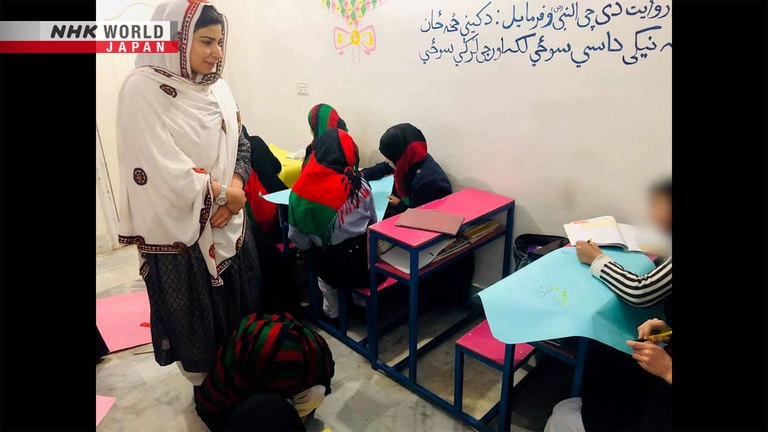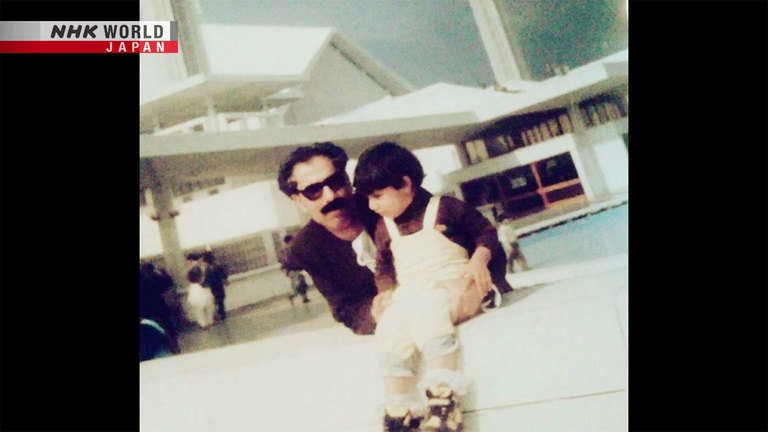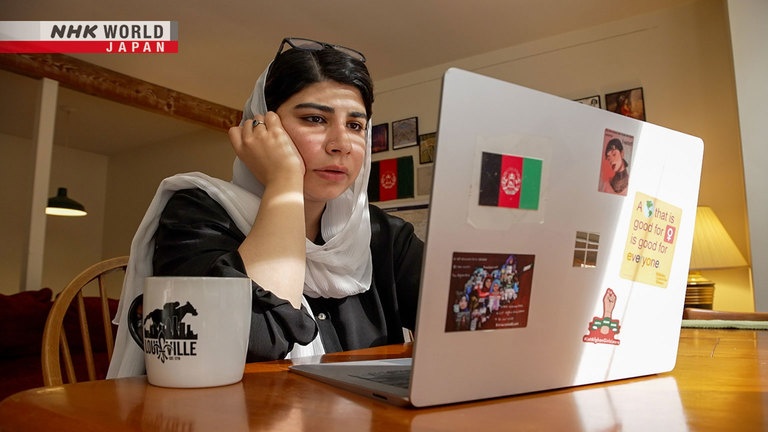Education, the Right To Be Humans: Pashtana Durrani / Founder, LEARN Afghan
Afghan girls face educational barriers with the Taliban. Pashtana Durrani defies this by operating a covert school, nurturing their unyielding thirst for knowledge. She fights for a brighter future.



Transcript
Direct Talk
There are numerous women
who have been forced to leave Afghanistan.
Yet, one individual continues
to fight for the girls back home.
Hi, my name is Pashtana Durrani.
I am the executive director
for Learn Afghanistan,
the school that you guys study at.
Pashtana Durrani is the founder
of a private non-profit organization
that operates "secret schools"
in Afghanistan.
The NPO cooperates with
supporters from around the world,
and creates an environment
where girls can receive an education.
Durrani felt that she was in danger
in her home country
and has now relocated to
the United States to continue her work.
So I just wanted to make sure
that I get in touch with you guys
and see what you think, how the class is.
How do you like it?
Class was really beneficial and
it was a great opportunity for girls
to continue their education and their studies.
The 26-year-old has been recognized
by the international community
with numerous awards
for her courageous efforts.
I think everybody needs education.
But the sad part is young girls are
the only ones whose education is politicized.
So that's why I work on
girls education and focus on them,
because why is their education
only political?
Durrani believes that continuing education
plays a pivotal role to defend women's rights.
Education, the Right To Be Humans
An Islamist force the Taliban
seized power in 2021,
sending shockwaves
through the women of Afghanistan.
The United Nations
maintains significant concern
over the violation of women's rights there,
given the ongoing restrictions
on their education and freedom to work.
And now in Afghanistan,
you're not allowed to go to a park,
you're not allowed to go to school,
you're not allowed to teach in a school.
You're not allowed to go to university,
you're not allowed to go to graduate studies.
You cannot work in your own business,
you cannot work in anything else
other than as a midwife.
Yeah, you cannot work in media.
You cannot work
as a political representative.
You cannot run for, we don't even have
a constitution to run for office so.
All of that.
In Afghanistan currently,
the one thing that I'm struggling with is
ensuring that these things continue.
Because we are struggling
with a lot of resources
because people don't care
about Afghanistan anymore.
A lot of people are focusing on other things.
In 2018, Durrani founded
a non-profit organization
dedicated to supporting
girls' education, "Learn Afghan."
This was prior to the
Taliban's ascent to power.
Even at that time, educational opportunities
for girls were not sufficient.
She has provided free online
study materials on tablets and other devices
for girls unable to attend school.
Additionally, she has established
schools in various regions
where students can take online classes,
creating learning opportunities
for more than 7,000 students to date.
Let's say, you are inside
and setting at home.
And the,
children, younger children can go to school,
even your younger sisters can go to school,
but you will always be the last
because you have to take care of them.
You have to do the house chores.
So even when it comes to learning,
you will probably be
the last person to learn.
Her upbringing played a crucial role
in shaping her growing interest in education.
Durrani was born in 1997
to a father engaged in business in Pakistan.
Her family had been living in Pakistan,
seeking refuge from the enduring
impacts of the long-running civil war.
So I was born in a traditional Afghan family.
When I was born, I remember
my mom tells me sometimes that
people expected a son
and I was a daughter,
so that was a big disappointment.
But my dad was very happy.
He was extremely happy.
Durrani's father, Zalmai held
an unconventional belief for his time
that everyone, regardless of gender,
should have access to education.
He turned his home into a school,
teaching his daughter
and other girls in the neighborhood.
It was a two-time school.
So in the morning and in the evenings.
Pretty accessible.
I remember that
girls who would come in the morning.
If they could afford,
they would even come in the evening.
If the time would afford them,
they would come in the evening and learn.
I would struggle at times
competing with my cousins was hard.
I have a lot of male cousins
and I would compete with them.
I still do.
But what would happen with that is like
I would remember
I was five, six and my father told me,
your only ticket out of this is education.
That's your ticket.
That stuck with me.
That still stuck with me.
You know, I still believe in it.
My parents believed in the right
to education and the right of women to work,
to live, to be their own people and humans.
After graduating from
high school in Pakistan,
Durrani wanted to pursue education
in her home country, Afghanistan.
And in 2019, she went to college
in the capital, Kabul.
She was shocked when she met her cousin
who lives in the countryside.
She could write and read.
But the sad part was she could write and read
by taking lessons from her nephew,
who would come every Thursdays and Fridays.
She would take lessons from him
every time he would go through the week,
she would start continually
repeating that lessons.
And that's how her learning was.
So that's where I realized,
we don't have schools,
we're in our own country,
but we don't have schools.
Durrani was determined
to create opportunities
for girls like her cousin
to receive an education.
That was the start of Learn Afghan.
They developed educational materials
that can be used on digital devices
such as cell phones and tablets,
so children who cannot attend school
can study at home.
The materials cover reading and writing
in the native language,
as well as learning English.
I am 14 years old.
I want to study IT to be a programmer.
They also enhance types of science education,
including physics and chemistry.
At first, not many people
understood her intentions.
When I would go to Kabul
and I would meet people like
the Education Ministry back in the day,
or people who were working on education
or like people, nonprofit organizations.
They were discrimination,
"Oh! you are returning refugees.
You don't understand how it works."
Or also
they would question
your intentions, you know,
"Oh you're spying for other countries."
Durrani received significant support
from local tribal leaders,
who were thought to be
reluctant to educate girls.
And I had to talk to them
and I had to literally lobby for stuff
and we had to talk about religion, culture,
the need for a girl to be in school.
But the fun thing was that
when you make all of these people angry,
you're also making a lot of people happy
and you find allies.
I was welcomed.
I was respected for what I believed in.
They might not have agreed with it,
but they were respectful to listen.
Three years after its establishment,
Learn Afghan has expanded its operations
to encompass 18 schools by the year 2021,
including some in rural areas.
We started working with 1000 teachers,
we trained 1000 teachers,
we trained 7000 students to ensure that
we put them in schools and they graduate.
All of them young girls and young boys.
And that's how learn became.
Taliban seized power in August 2021.
However, in August 2021, the Taliban
took control of the capital, Kabul.
We had to shut down everything that we did.
All the schools were closed down.
And it was not an easy time in my life.
I remember crying for weeks.
Furthermore, shortly before the event,
Durrani's father, who had been
a guiding force in her pursuit of education,
passed away.
He passed away in 2020.
He saw a better Afghanistan, I'd say,
because the bloodshed in Afghanistan
has continued and it still continues actually.
I'm grateful that he didn't see
Afghanistan falling.
I actually am.
Because he could never have borne
what happened in Afghanistan.
I have never loved anything more in my life
than my father and Afghanistan,
and losing both of them hurt me
in a way that I can never recover from.
A month later, undeterred Durrani
resumed her activities.
She initiated a secret school,
conducting lessons in the basements
of various hospitals and guesthouses.
Upon the school's reopening,
it drew in approximately 100 students
eager for an opportunity to learn.
I'm so proud.
I have never been so proud
of anything in my life,
the way I'm proud of my students
and the way they show up to their school.
But we make sure that they're not
put in extreme danger or direct danger.
So we're always mindful about that.
We do our own risk assessment management
where we look around and see
if our students are being followed,
if our teachers are being followed.
Subsequently, the repression of Durrani
by the Taliban regime
intensified with each passing day.
All our bank accounts were blocked,
our offices were taken,
and I didn't have anything with me.
No money, you know.
I mean, I didn't believe that
they're going to stay in power
or anybody is going to let them be
in power for that long.
I didn't think that
me leaving caused an option.
Nevertheless, an event unfolded
that pushed Durrani to the brink.
I remember two of the activists
who were put on camera
by the Taliban leader were discovered,
and they were made to say stuff pro-Taliban
on international media.
And that was the thing that I would never do.
I can never do that.
And
that's where I had to take this decision.
I didn't want to leave
until the very last few days.
I was forced to leave.
Durrani departed Afghanistan in November 2021
with the support of American backers.
She is currently a visiting fellow
at Wellesley College, near Boston,
where she teaches a class
on social entrepreneurship.
Despite the severe restrictions on women's
education imposed by the Taliban regime,
the secret schools continue to operate.
OK, perfect. How many students do we have?
There are 108 female students.
In class "A",
7 students will graduate from the 12th grade.
They are the first graduates of our high school.
OK. Perfect. Thank you so much.
The secret schools
persist in their expansion,
supported by local allies
who defy Taliban surveillance and control.
The vision is 34 schools by the end of 2025.
In all, 34 provinces of Afghanistan.
And I think I'll run 300 schools
by the end of 2030
in all districts of Afghanistan.
So I plan big.
Yeah, I'm in for the long run.
Durrani is continually motivated by
the voices of girls who yearn for knowledge.
One girl wanted to be a journalist.
That makes me happy, that keeps me motivated.
I just like seeing ambitious,
striving young girls
who are going to become
amazing women leaders.
It's good to have ambitious women.
It's good to have ambitious young girls.
We asked Durrani to give us her insights
on what actions we should take
to overcome our challenges.
Believe in yourself like a child.
It's very important.
When I was seven, I believed
I could be the president of Afghanistan.
I still do.
I still do.
I believe that could change the world.
And I still do.
Our goal is not for our goal to be in school.
Our goal is to ensure that the graduate
from grade 12, they end up in good colleges.
They become their own independent people,
and they also become leaders.
The goal is to ensure that they become
the leaders that Afghanistan deserves.